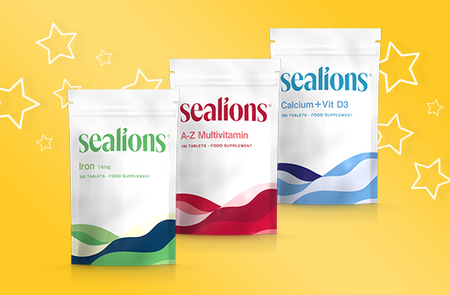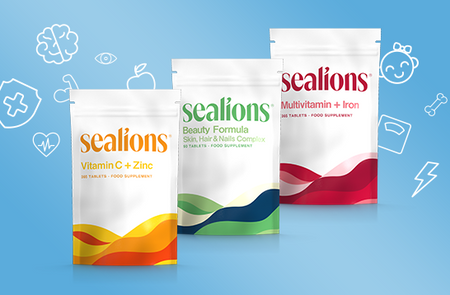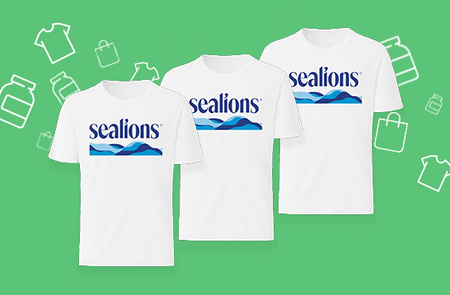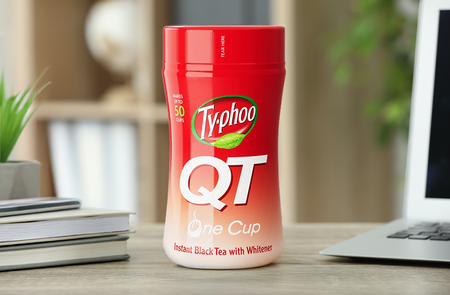
What is Vitamin D 1000 IU? Its Benefits & Why You Need It
One in six UK adults, and almost 20% of children, have low vitamin D, the government says. Vitamin D 1000 IU is a simple daily top‑up many people use when sunshine is short.
In this guide, we’ll explain what “1000 IU” means, who needs it most, the key benefits, safe upper limits, and how to take it alongside food and sun.
What is Vitamin D?
Vitamin D is an essential vitamin that performs a variety of functions. Fat-soluble vitamins are produced when your body is exposed to direct sunlight, but certain foods contain them.
However, supplements can increase your daily intake if you don't get enough Vitamin D from being outdoors or eating foods that contain it.
What's the recommended daily intake of Vitamin D?
Vitamin D amounts are measured using International Units (IU), and adults require different amounts than children. Your recommended daily intake also depends on whether you have a deficiency or special dietary needs.
Here are the recommended dietary allowance guidelines:
|
Group |
Minimum Vitamin D Intake |
Maximum Daily Intake |
| Babies Under 1 | 350 to 400 IU (8.5 to 10 micrograms) | 1000 IU (25 micrograms) |
| People Aged 1 & Over | 400 IU (10 micrograms) | 4000 IU (100 micrograms) |
What is Vitamin D 1000 IU?
Vitamin D 1000 IU is a moderate dosage that suits most people. You'll notice that the majority of supplements are labelled as D3, because they're more effective than D2.
Vitamin D3 - also known as cholecalciferol - is the type your body naturally produces with enough sunlight, as supplements containing it are easier for your body to absorb.
While you can find lower and higher strength supplements, many people choose 1000 IU, which benefits them during the winter, when there's less sunlight. This dosage is also enough to support calcium absorption and support the immune system.
View Vitamin D3 1000 IU Supplements
The benefits of taking Vitamin D 1000 IU supplements
Vitamin D deficiencies can cause a range of issues, including bone pain, fatigue, mood changes, and weak muscles. However, people with a severe deficiency are more at risk of rickets and osteomalacia, both of which can cause ongoing complications.
Supplementing your diet with Vitamin D3 offers a range of benefits.
Normal immune system function
Vitamin D supports your immune system as it helps the body fight off bacteria and recover from viruses. Numerous studies have shown that individuals with low levels are more at risk of colds, flu viruses, and infections, highlighting its importance (NIH).
The MS Society also confirms that low Vitamin D levels increase the risk of developing autoimmune conditions.
Promotes healthy bones and teeth
Another key function of Vitamin D is its ability to support calcium absorption. The mineral is essential for healthy teeth and ensures that young people develop normal bones. Children and older adults with low levels are at more risk of fractures.
Research shows that Vitamin D supports bone health, making it a vital supplement for people of all ages (Oxford Academic).
Mental health
Many people experience mental health issues - especially in the winter. Vitamin D supplementation can support people with Seasonal Affective Disorder (SAD), reducing depressive symptoms and improving their moods.
While research into the impact of Vitamin D on mental health is still ongoing, its ability to support normal immune function and enhance mobility means that supplementation can also have a holistic effect on your moods by promoting a healthy lifestyle.
Preventing chronic diseases
Some specialists believe that Vitamin D may also reduce the risks of cancers, type 2 diabetes, and heart disease. However, it's important to remember that research is still ongoing, and there are no concrete studies to prove that taking Vitamin D 1000 IU can prevent you from developing chronic diseases.
Who can benefit most from Vitamin D 1000 IU dietary supplements?
While many people get enough Vitamin D during the spring and summer months, deficiencies are common during the autumn and winter. If any of the following apply to you, a Vitamin D 1000 IU supplement can enhance your overall health:
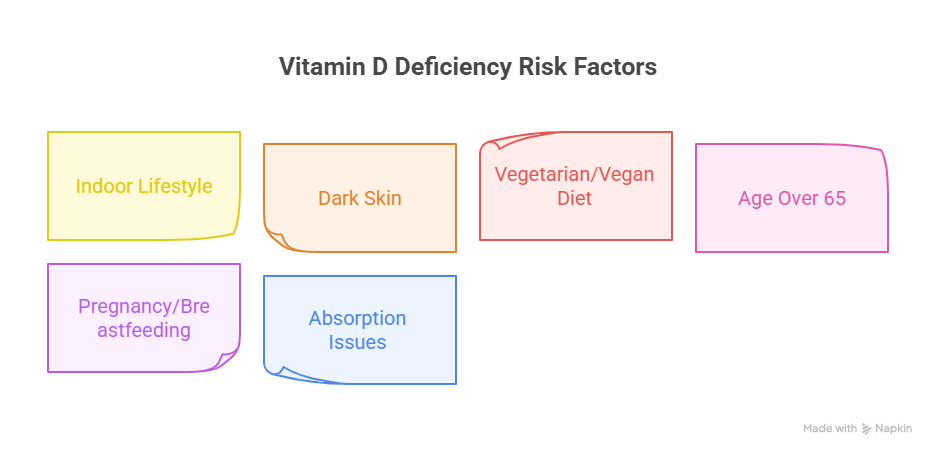
- You spend a lot of time indoors
- You have dark skin, which produces less vitamin D from sunlight
- Are vegetarian or vegan, as most sources of vitamin D are animal foods
- Are over 65
- Are pregnant or breastfeeding
- Have a condition that limits nutrient absorption, like Crohn's or coeliac disease
How should I take Vitamin D 1000 IU food supplements?
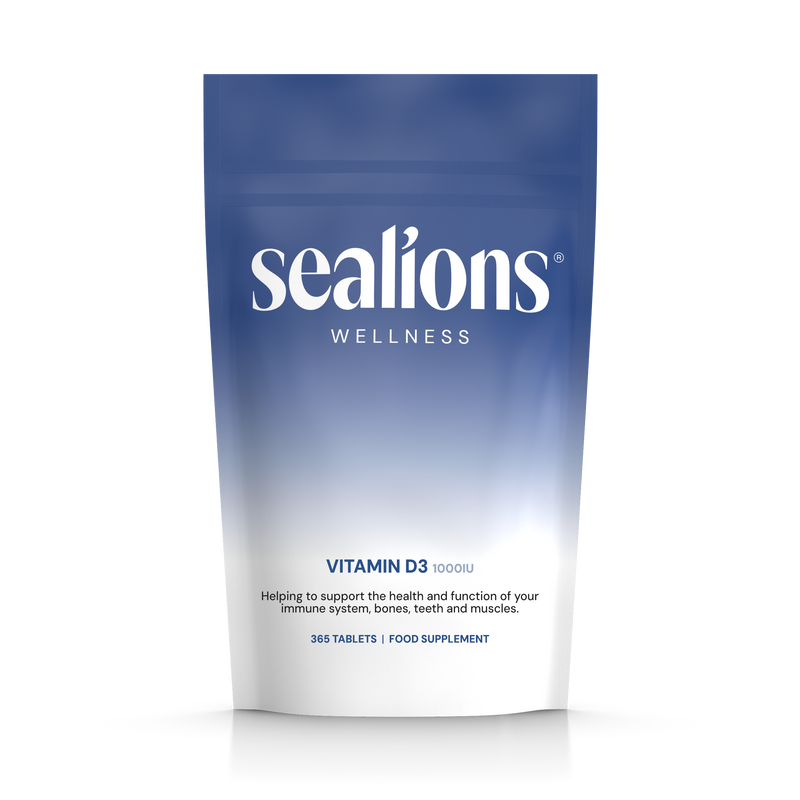
It's important to note that you should follow a varied and balanced diet when possible and get plenty of sun exposure (while protecting your skin from UV rays). However, taking a dietary Vitamin D supplement can give your body the boost it requires.
You'll find a range of supplements available, including chewable gummies, tablets, capsules, sprays, and drops.
Sealions offers high-quality supplements that give your body the support it needs while ensuring you save money.
Our Vitamin D3 1000 IU Tablets cost just £2.50 for a year's supply, and are suitable for vegetarians.
How much Vitamin D is too much?
While Vitamin D can support the normal absorption of calcium, taking too much Vitamin D can lead to complications.
Specialists recommend a maximum intake of 4000 IU (100 micrograms) daily. Exceeding this amount can lead to a range of complications, including hypercalcaemia (calcium buildup), which can cause heart and kidney damage.
The bottom line
Vitamin D 1000 IU is a safe and effective way to reduce the risks of Vitamin D insufficiency. While it's usually enough to support people living in the UK, if you have a severe deficiency or require additional support, Sealions also offers a Vitamin D 3000 IU supplement.
If you're unsure which dose is right for you, a medical professional will be able to offer advice. Our experts can also answer any questions about Vitamin D supplements, so please don't hesitate to get in touch with us.
Tagged:

